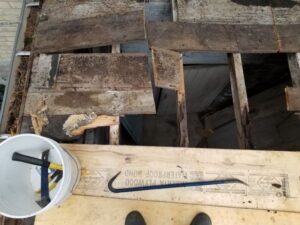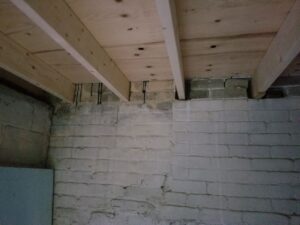So you’ve just bought a house! This is an awesome occasion that can also be scary if you’re a first time buyer. One thing you definitely need to worry about is maintenance. This is a concern for even a brand new property.
When you own a home long enough you’ll learn that things break, drains get clogged and taps eventually leak. Shingles wear out, furnace filters need changing and doors become squeaky. The list goes on and on. So what are you going to do?
You’ve got two choices; hire someone or fix stuff yourself. There are all kinds of odd jobs that you can do by yourself, both safely and affordably. And there’s nothing wrong with hiring people and in some cases this is 100% necessary.
For instance it’s illegal to work on gas equipment if you don’t have the required certification. And while you can do your own electrical work there are limits as to what’s allowed. For bigger jobs you’ll often need a licensed contractor to check and sign off on your work.
If you’re going DIY, you can’t do much around the house without tools. So the question ‘what tools do I need for my home?’ is an important one.
I started my tool collection a long time ago when I was riding and racing motorcycles and working on cars as a teenager. I also spent some time in the building trades installing glass and picked up some more tools for that job. And once I became a homeowner I began adding power tools and drywall and plastering equipment to my collection.
When you have tools there’s really no limit to what you can accomplish. I spent Thanksgiving weekend replacing a roof on the vestibule going into my basement. It was a lot of work but I saved $1000 to $1500 in labour and I know the job was done right.
I’ve never worked on natural gas because of the risk. This was simply common sense even before I found out you needed certification just to touch it . But I’ve done pretty much every other repair over the years. So here’s a list of homeowner tools that will make your life easier. I’ve put them into categories but many of these tools are multipurpose.
The Basic Tool Box
- claw hammer (don’t get a framing hammer or ball peen)
- screwdriver set (red and green Robertson, two sizes each of slot and Phillips)
- allen keys and torx bits (nice to have especially for Ikea furniture)
- adjustable wrenches (good alternative to a proper wrench set)
- side cutter pliers
- tape measure (metric and imperial in one tape)
- visegrip pliers (a brand of very good locking pliers)
- utility knife (I prefer the ones with replaceable as opposed to snap off blades)
- hacksaw (cuts plumbing, metal and even wood in a pinch)
- tool box (don’t buy a small box like this).
- flashlight (dollar store LED works just fine)
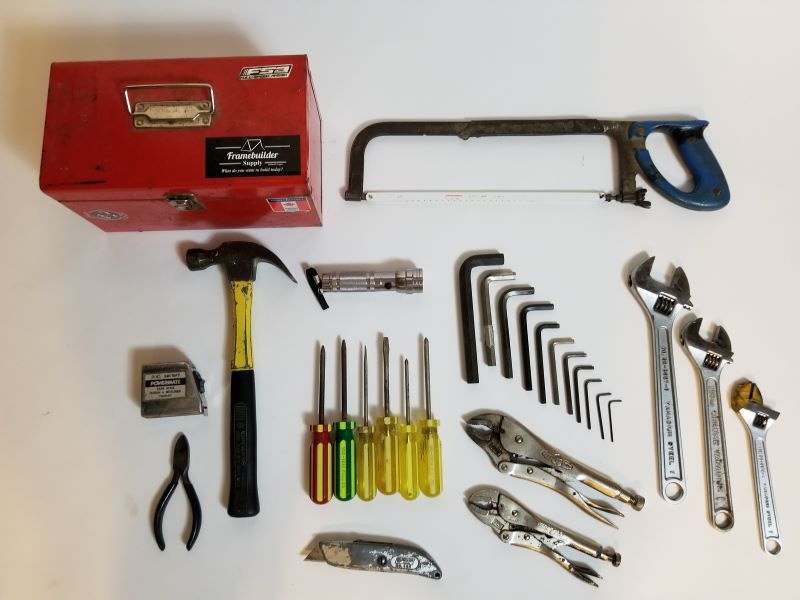
Tools For Plumbing
- pipe cutter for cutting copper(red thing in picture)
- hacksaw for cutting ABS or PVC
- abs and/or pvc cement (ABS is the more common waste piping here)
- propane torch for soldering
- torch lighter (a cigarette lighter works too)
- lead free solder (for soldering copper pipe)
- flux (to clean copper solder joints)
- teflon tape (essential on many plumbing fittings)
- PEX tubing tools if working with PEX (I don’t work with it, not shown)
- plumbers grease (for lubricating taps and faucets)
- wrenches (for installing lines and hardware)
- o-rings and washers (taps and faucets)
- plumbers cloth/roll (a very coarse sand paper for cleaning copper)
- snake (for unclogging drains-mine’s hiding somewhere)
- plunger (not shown)

Tools For Electrical Work
- multimeter (to check for live wires)
- wire strippers (the easy way to strip insulation)
- a box of marettes (to connect wires inside a fixture)
- lineman pliers (for twisting wire and cutting)
- screwdrivers (for light switches and receptacles)
- utility knife (for cutting insulation)
- side cutters
- wrenches (working with conduit, etc.,)

Drywall and Plastering Tools
- hod/hawk (a flat 1 foot square tool for holding plaster-not shown)
- trowel (used for smoothing drywall compound and plaster)
- putty knife (used for applying plaster and d.w. compound)
- drywall saw (for cutting out holes for outlets, etc.,)
- electric drill (for drywall screws and mixing)
- mixer tool for drill
- buckets for mixing
- heavy chisel (not shown-used for plaster crack repair)
- pole sander for drywall (hand version shown)
- utility knife (for scoring drywall sheets and cutting tape)
- chalk line tool (marking screw locations and cutting lines)
- heavy cutters (for cutting metal lath for plaster work)
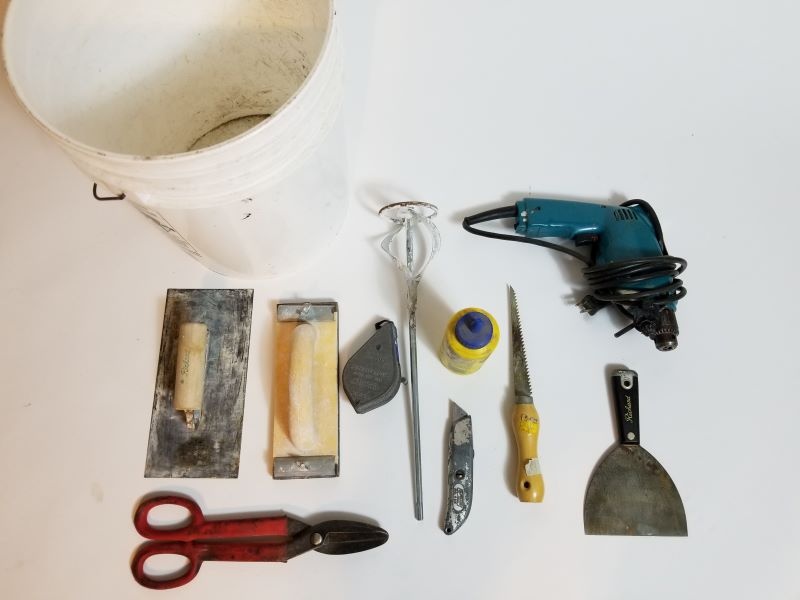
Tile work and bathrooms
- rubber mallet (for setting tiles)
- utility knife (for cutting out old caulking)
- putty knife (for spreading compounds)
- rubber spreader (for applying grout)
- drill and mixing tool (for mixing setting compound)
- caulking gun (not shown-for caulking around baths and sinks)
- adhesive spreader (for spreading setting compound)
- grout removal tool (power tools work much better)
- grout float (rubber so the tiles don’t get scratched)
- sponges (also used with grout)
- bucket (for water and for mixing compounds)
- level (tiles should be level)
- chalk line (for laying out your tile pattern)
- tile saw (powered and water lubricated-not shown)
- tile nipper (not shown)
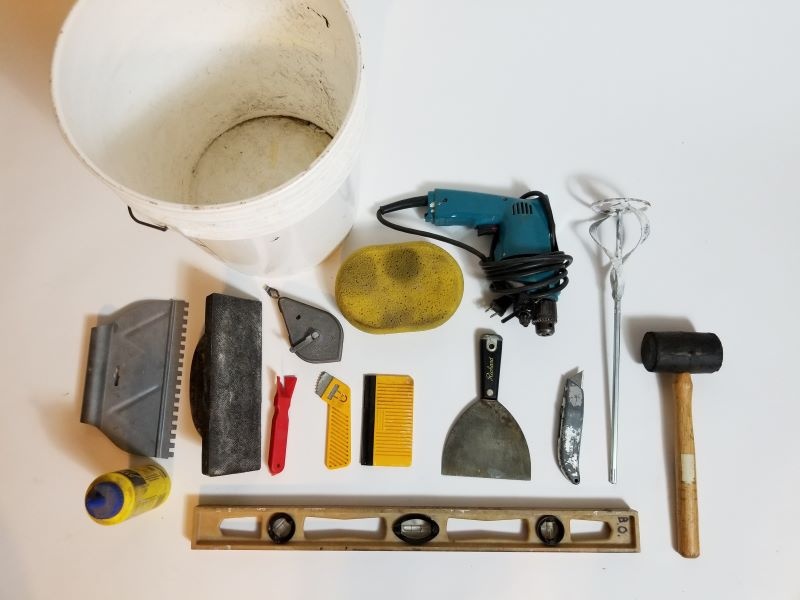
Tools for general carpentry
- table saw (in my garage-not shown)
- circular saw (mine needs a new blade)
- reciprocating saw (comes in handy)
- chop saw (not shown)
- mitre box (used for cutting door and window trim)
- hand saw (can be quicker and easier than power tools)
- chalk line (multi purpose)
- level (no one likes a crooked door)
- jimmy bar (pulling nails, wrecking stuff)
- wood working chisels
- extension cords (not shown-I have ~150 feet)
- nail set (beats marking up your wood)
- orbital sander (not shown)
- square (not shown-for making perfect cuts)
- screwdrivers (Phillips and Robertson most common)
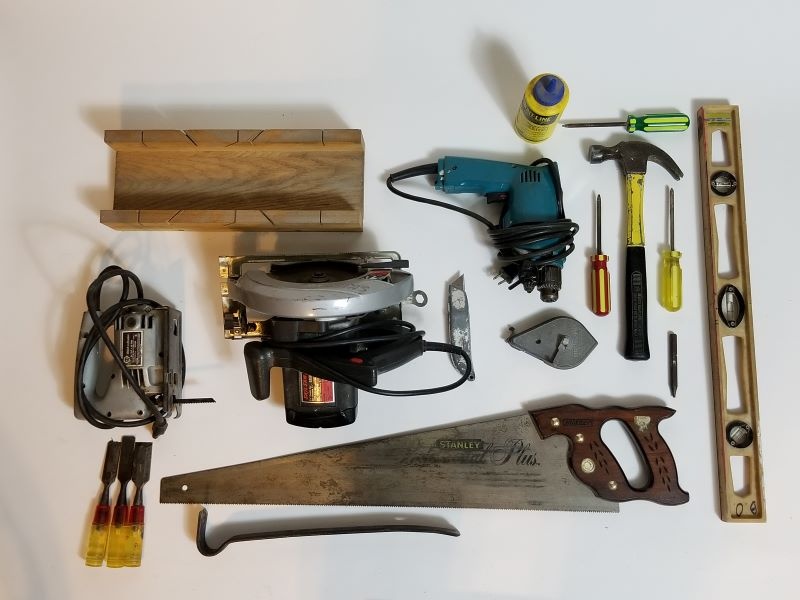
I’d advise you to stay away from cordless tools. Batteries have a limited lifespan and you might not be able to get replacement batteries 10 years down the road. And if you do go cordless you’ll need to remember to keep the batteries charged up especially if you are only breaking the tools out on occasion.
My power tools all have cords. Yes, dragging around a cord is a pain but I never have a dead battery. One of my drills is easily 40 years old and still works perfectly. Cordless only makes sense in the professional trades when the tools are used on a daily basis and are a tax write off.
Now you can get started on your tool collection. Don’t let the question ‘what tools do I need for my home?’ intimidate you. Start off small with the basics and buy stuff as the need arises. As you gain experience and confidence the sky’s the limit. At that point you’ll probably need a bigger tool box. By the way, a bucket works perfectly for carrying your tools and supplies around.


